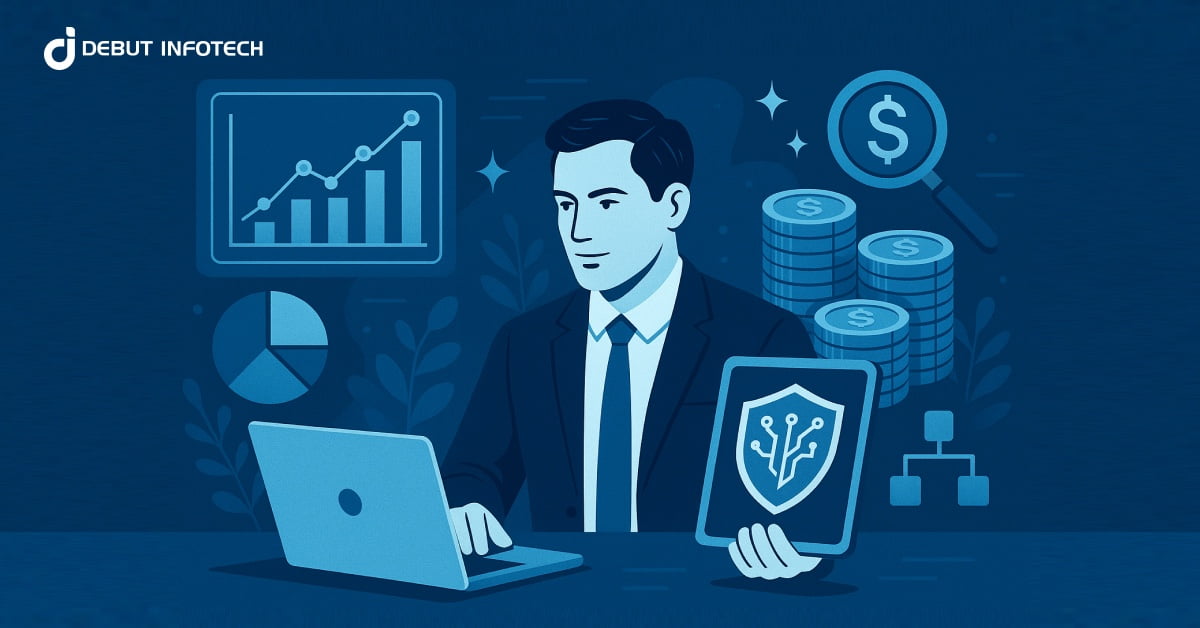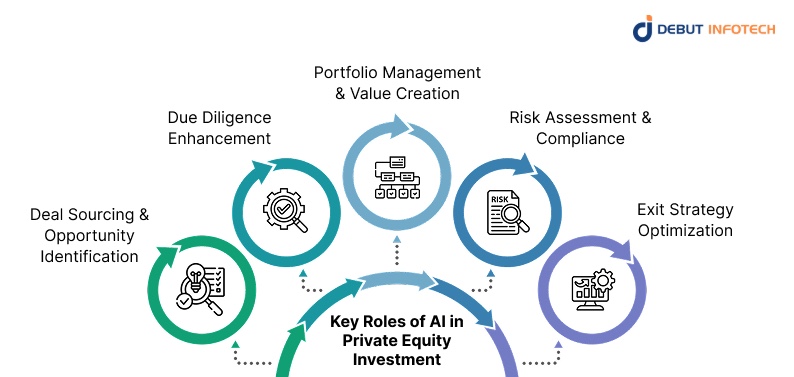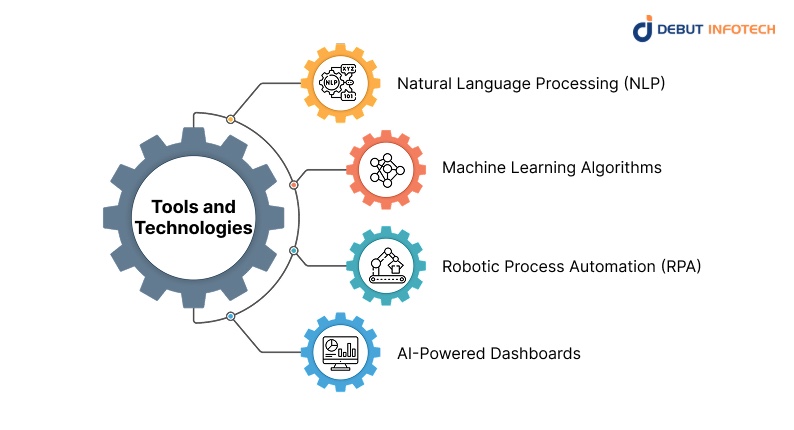Table of Contents
Home / Blog /
How AI for Private Equity Is Transforming Smart Investment Decisions in 2026
November 12, 2025

November 12, 2025
Introduction
Private equity has always been about finding value where others don’t, spotting opportunities, minimizing risk, and maximizing returns. But in today’s data-driven world, that edge increasingly comes from technology. And at the center of it all is AI for private equity.
Instead of relying solely on human intuition or outdated spreadsheets, firms are now using AI to uncover patterns hidden in massive datasets from market trends to customer behavior. This shift isn’t just improving decision-making; it’s transforming how deals are sourced, valued, and managed.
Recent insights from Deloitte highlight how AI is evolving from an experimental tool into a strategic necessity, with projections that by 2030, one in four PE firms will use AI for portfolio valuations. That’s a clear sign the future of investing belongs to firms that can combine human expertise with machine intelligence.
In this guide, we’ll break down how AI is helping private equity firms make smarter, faster, and more profitable investment decisions and what that means for the next era of finance.
Let’s get started!
Why Private Equity Needs AI in 2025
The private equity world is evolving rapidly. The volume of deals is increasing, yet the time spent to review these deals is becoming shorter. What would have required months of research and modeling would now have to occur within weeks or days. That’s where private equity artificial intelligence comes in.
AI is assisting companies to process complicated data at an incredible rate, providing investors with a better understanding of what is going on before they take action. Consider the amount of information that is involved today ESG metrics, consumer behavior information, and even indicators provided by other datasets such as satellite imagery or social media sentiment. The pace can not be maintained by human teams only, but by AI.
And there are already companies demonstrating the possibilities. Take Blackstone, for example. They have been using AI models to examine market trends and consumer sentiment prior to making acquisitions. This places them at an advantage as they can see the opportunities and the red flags early and before other competitors are even aware.
AI is not only assisting the work of the private equity firms in responding to changes in the market; it is also assisting in predicting them. In 2025 and beyond, the people who will adopt this technology will not only move faster, but will be smarter in their investments.
Turn portfolio data into predictive insights with our AI engines.
Drive smarter investments and uncover hidden opportunities.
Key Roles of AI in Private Equity Investment

AI is reshaping the way that private equity firms locate, analyze, and expand investments. Decisions are being made with real-time insights and predictive analytics, whereas previously they were made with experience and intuition as the primary supporting factors. Although AI cannot substitute human judgment, it reinforces it, assisting firms to source deals quicker, less biased, and generate smarter and data-informed decisions. That’s why AI investments for private equity are becoming a core strategy for modern investors.
- Deal Sourcing & Opportunity Identification
Gone are the days when you had to go through spreadsheets and long reports to find potential deals. AI currently scans through thousands of data points across various sources, such as news articles, financial reports, social sentiment and even competitor performance to identify any hidden gems before others do.
With natural language processing (NLP), early signs of either growth or distress in companies would be flagged by these intelligent systems, otherwise unknown. To investors, it is a reduction in the amount of speculation and increased accuracy in determining underperforming targets that can be turned around.
- Due Diligence Enhancement
Due diligence may or may not bring an investment to fruition and it is usually the most time-intensive step. AI helps to simplify the work of human analysts by automating document reviews, checking financial records, and identifying anomalies that may go unnoticed by human analysts.
Instead of flipping hundreds of pages to review them, analysts are able to concentrate on the interpretation of insights rather than on their collection. This enables companies to review more transactions more quickly without loss of accuracy- providing them a competitive advantage in rapid technology private equity setting.
- Portfolio Management & Value Creation
After an investment has been made, AI does not cease operation but redirects to the creation of value. Predictive analytics is useful to track the performance of portfolio companies on a real-time basis, anticipating changes in revenue, customer churn or operational performance.
AI-based dashboards offer actionable KPIs which assist the management teams to make adjustments to their strategies in advance, be it in terms of enhancing sales, allocating marketing funds more effectively, or expanding their market segments. It is about transforming data into smarter and faster decisions that lead to long-term growth.
- Risk Assessment & Compliance
The basis of sustainable investing is risk management. AI goes a step further and conducts regular scanning of compliance problems, credit risks, and market volatility indicators. Machine learning models are able to identify subtle patterns that may indicate some red flags that firms can act before the risks escalate.
With automated risk scoring and compliance verification, private equity firms have the satisfaction of having their portfolios remain in line with international best practice and changing regulatory frameworks.
- Exit Strategy Optimization
The right timing to exit can determine the success of an investor, and AI is assisting companies to do it more frequently. Predictive models use macroeconomic indicators, market dynamics, and M&A to predict the most lucrative exits.
Regardless of whether one is planning to take a company to IPO or a strategic sale, AI will guide in identifying the best time that the market is at its best. The result? Optimal returns and less uncertainty in closing the deal.
How AI Is Redefining Decision-Making in Private Equity
In private equity, all decisions matter, whether it is the selection of the right startups to invest in or the right moment to pull out of an investment. Traditionally, these decisions were made intensively based on human intuition, experience and in a few instances, a bit of gut feeling.
Artificial intelligence is introducing a new dimension of transparency and trust to the process of making deals. Through AI investments for private equity, companies are able to make decisions that are smarter, faster and more objective with real-time data. Rather than reviewing volumes of financial statements or market predictions, investors can trust AI algorithms that handle large volumes of data within seconds picking up trends and risks that would otherwise remain invisible to their human.
The best thing about AI is that it eliminates the emotional aspects of investment judgment. Predictive analytics provide insights that surpass intuition by examining historical trends, performance metrics and even the smallest of changes in consumer behavior. The result? More precise and less missed opportunities and more confident about the decision made.
As one expert put it, “AI isn’t replacing intuition; it’s sharpening it.” It gives investors the ability to balance data driven intelligence and human experience, the ideal blend of analytical accuracy and strategic intuition. In a more competitive market, such a mixture might make the difference between dominating the game and being the underdog.
Tools and Technologies Powering AI in Private Equity

Behind every smart investment decision today lies a blend of powerful AI-driven technologies working quietly but effectively in the background. These tools are reshaping the way that private equity firms evaluate data, calculate risk, and identify high-value opportunities before anyone else, marking a new era in private equity innovation.
Let’s take a closer look at the technologies making this transformation possible.
1. Natural Language Processing (NLP)
Private equity thrives on information but much of it lives in unstructured sources like reports, news articles, or even social media chatter. That’s where NLP steps in. It also enables AI systems to “read” and process large volumes of text to discover market sentiment, identify red flags in company reporting and even predict new trends. As an example, thousands of earnings calls or regulatory filings can be scanned by an NLP model in a few seconds and the patterns extracted that a human analyst might entirely miss.
2. Machine Learning Algorithms
Machine learning models are the analytical engines of modern private equity. These algorithms are able to determine how an investment will perform in the future with high precision by studying historical deal data, performance measures, and macroeconomic factors. Imagine it as a kind of assistant that continuously learns on each deal and assists investors to find an undervalued asset and predict the risks before they emerge.
3. Robotic Process Automation (RPA)
Due diligence may be a marathon, going through volumes of financials, contracts, and compliance documents.
RPA ensures that it is quicker and a lot less painful. It replaces manual processes, which may be time consuming such as document classification, data entry, and compliance checks, with automation. This provides analysts with increased time to work on strategy as opposed to paperwork, streamlining the whole procedure and rendering it more accurate.
4. AI-Powered Dashboards
Finally, data visualization tools powered by AI bring clarity to complexity. Rather than having spreadsheets and stagnant reports spread all over, companies have turned to dynamic dashboards allowing real-time views of the health of a portfolio, the level of risk exposure, and the predictability of performance. Imagine having a live snapshot of every asset, market, and variable influencing your fund, all in one place. That’s the visibility AI brings to private equity decision-making.
Future Outlook: The Next Frontier of AI in Private Equity
Looking ahead, the role of AI in private equity is gearing up to be far more than just a helper, it will be an indispensable co-pilot. As firms push deeper into predictive modeling, automation, and decision augmentation, we’re already seeing the outlines of what the future holds.
1. Predictive Exits & Valuation Modeling
Imagine the possibility of knowing not only the companies that would prosper, but when to pull out as well. In the near future, AI systems will also provide valuation models that will run financials, market sentiment, and competitive data in real-time. Rather than relying on quarterly snapshots, firms can adopt continuous valuation, adjusting deals to live conditions.
- Deloitte expects that up to 25% of PE firms will use AI to enhance portfolio valuations in the near future.
- These models can highlight undervalued opportunities before human teams even flag them.
2. Quantum Computing for Faster Portfolio Analysis
The combination of AI and quantum computing is one of the most promising changes in the future. Traditional models hit scaling limits when datasets grow complex; quantum methods promise to break through those limits.
- Quantum logic methods can optimize portfolios with dozens or hundreds of constraints, tasks classical methods struggle to handle.
- The synergy between agentic AI and quantum systems is also emerging: “quantum agents” that combine decision logic and high-powered processing to act autonomously.
- In private equity, that could mean running scenario planning across multiple macroeconomic paths instantaneously.
3. AI-Driven LP Reporting & Automation
Limited Partners (LPs) require transparency and real time information. However, soon a lot of these reporting tasks are not going to be manual.
- AI agents will automate LP reporting by pulling data, generating narratives, and flagging anomalies.
- Firms like Beam AI are already exploring how agents can monitor portfolio company metrics, surface value drivers, and anticipate risks without human intervention.
4. AI Agents Monitoring Portfolio Health
Finally, think of AI agents as silent watchers in your portfolio ecosystem. These agents will continuously monitor performance, flag deviations, and suggest proactive measures.
- They analyze sales trends, cost overruns, churn signals, and more, often before the human eye picks them up.
- In effect, artificial intelligence technology becomes the nervous system that senses tremors across the entire investment portfolio.
Ready to leverage AI for smarter, faster private equity decisions?
Let’s build a custom AI strategy to boost your returns.
Final Thought
AI is not another financial fad, but rather the key to smarter, quicker and more strategic investments Regarding AI for private equity, its outcomes are self-evident: quicker deal sourcing, more accurate due diligence, and data-informed insights that enable companies to make assured and highly-valued choices.
Nevertheless, human intuition cannot be substituted even with the most sophisticated algorithms. The winning tactic is collaboration, where technology manages complexity and investors can utilize judgment, creativity and experience to translate insights into actual outcomes.
Debut Infotech, a leading AI development company that assists the private equity firms in creating intelligent systems to reveal the market trends, minimize risk, and make premonitive predictions.
If you’re ready to future-proof your investment strategy, it’s time to explore what AI can do for you. Partner with experts who understand both technology and finance and start investing smarter today!
Frequently Asked Questions (FAQs)
A. AI is transforming the private equity (PE) industry, but it won’t replace human professionals anytime soon. Instead, it’s becoming a powerful assistant, helping investors work faster, make better decisions, and improve efficiency at every stage of the investment process.
A. No, the private equity industry isn’t safe from AI and that’s a good thing.
AI is transforming how firms operate and compete at every level. It’s now being used throughout the entire investment lifecycle from deal sourcing and portfolio management to exit strategies.
A. Private equity firms use AI to work smarter at every stage of the investment cycle. It helps automate time-consuming tasks, uncover new deal opportunities, and make faster, data-driven decisions.
Instead of relying only on spreadsheets or manual research, firms can now use AI to scan massive datasets and spot hidden investment trends. During due diligence, AI accelerates analysis, cutting down human error and effort. It also helps optimize portfolio performance by revealing ways to boost efficiency and growth.
When it’s time to exit, AI for private equity pinpoints the best timing and potential buyers, helping investors maximize returns with confidence.
Talk With Our Expert
USA
2102 Linden LN, Palatine, IL 60067
+1-708-515-4004
info@debutinfotech.com
UK
Debut Infotech Pvt Ltd
7 Pound Close, Yarnton, Oxfordshire, OX51QG
+44-770-304-0079
info@debutinfotech.com
Canada
Debut Infotech Pvt Ltd
326 Parkvale Drive, Kitchener, ON N2R1Y7
+1-708-515-4004
info@debutinfotech.com
INDIA
Debut Infotech Pvt Ltd
Sector 101-A, Plot No: I-42, IT City Rd, JLPL Industrial Area, Mohali, PB 140306
9888402396
info@debutinfotech.com




Leave a Comment